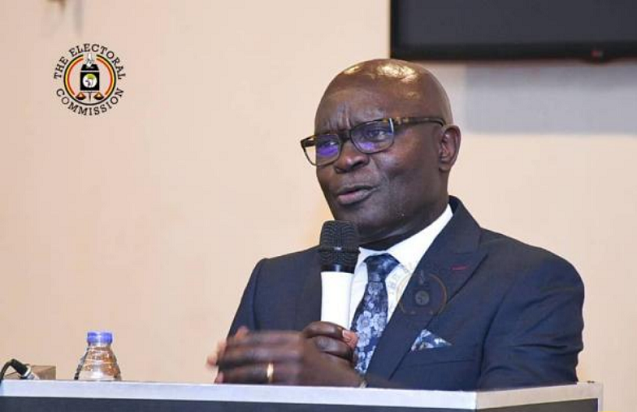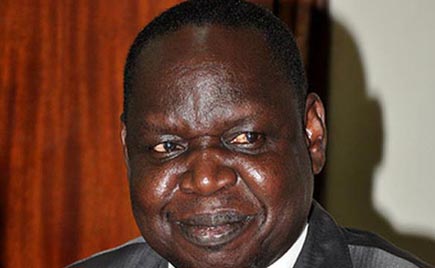Justice Simon Byabakama Mugenyi, the EC Chairperson
The Electoral Commission (EC) has pledged to conduct a credible electoral exercise in 2026. Justice Simon Byabakama Mugenyi, the EC Chairperson in his statement read by Anthony Okello, during a Regional Broadcasters Conference on Broadcasting Standards and Content Development at Heritage Courts Hotel in Arua City on Tuesday, revealed that the exercise of field demarcation of electoral areas for representation at local governments has been concluded.
Justice Byabakama added that the commission has also concluded the exercise of reorganizing polling stations countrywide to enable voters to cast their votes conveniently. “We are currently conducting the nationwide identification and mapping of persons with disabilities on the National Voters Register. This is being undertaken as a measure to ensure that the entire electoral process is as inclusive as possible and conducted under conditions of free and fairness to, among others, enable persons with disabilities to vote without any hindrances,” Justice Byabakama noted.
The next activity will be a general update of the National Voters Register in each parish or ward countrywide. Justice Byabakama commended the media for their invaluable contributions to the electoral process and urged them to embrace good election reporting practices, by studying the electoral roadmaps critically and understanding the processes so that they can follow progress and report from a point of knowledge.
The media practitioners are also challenged to understand the electoral cycle and how processes feed into each other, to ease their communication functions and help the masses understand the activities, rights, duties, and responsibilities during the electoral process.
“Acquaint yourselves with the laws, especially those that apply to media rights, duties, and responsibilities. Acquaint yourselves with the legal framework for the various electoral activities so that you can give an informed opinion,” he stated. The media is also asked to promote peaceful campaigns and support conflict prevention by ensuring that political differences and debates do not lead to hostility and or escalate to conflict levels.
“The media can often incite violence through unbalanced, inaccurate or inflammatory reporting. We have seen examples of election-related violence in the region, which was largely fueled by media houses,” Justice Byabakama stated. Justice Byabakama pledged that the EC would commit to a transparent engagement with the media at all times and maintain an open-door policy where media inquiries will be handled expeditiously.
“A successful election process is a product of the effort of all stakeholders. The Commission acknowledges and appreciates you for supporting the electoral process to date,” he noted. When asked why other candidates of the opposition are stopped from talking on the radio, yet these are candidates EC has allowed to campaign, Anthony Okello, a commissioner at the electoral commission, also focal point commissioner for West Nile Sub-region, encouraged journalists to give equal access and time to every candidate irrespective of the party.
Okello explained that there is a need for the electoral process to be done in a secure way, and asked members of the opposition to liaise with the Resident District Commissioners, who are the heads of the security committees in administrative units, to prevent complaints of being denied access to the media.
In August, the EC launched the Strategic Plan 2022/2023-2026/2027 which it says will help it deliver a free and fair election come 2026.
-URN





